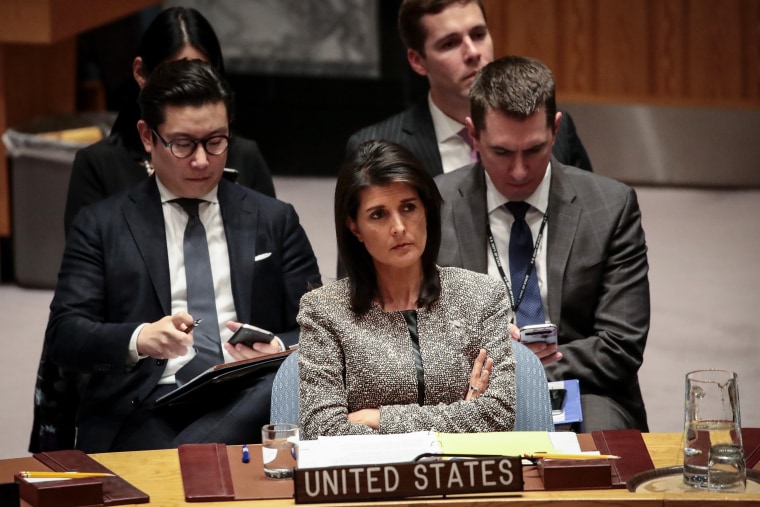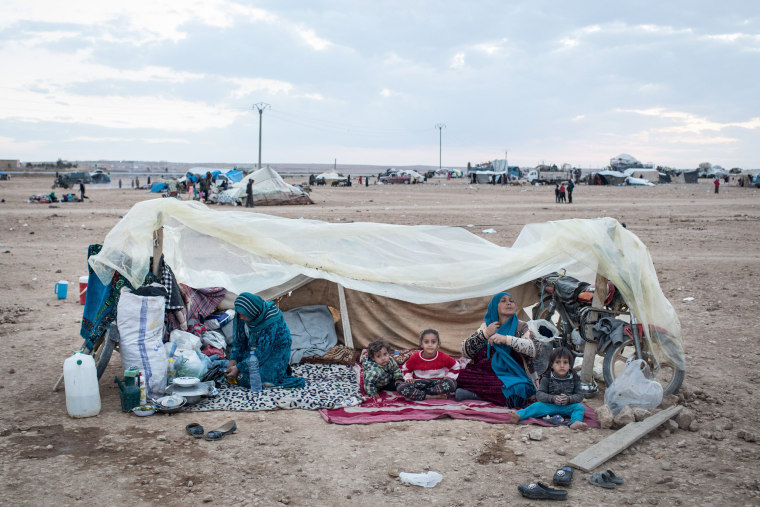The United States has walked away from a United Nations effort to ease the global migration and refugee crisis, with the Trump administration saying it was no longer compatible with U.S. principles or priorities.
In a statement, the U.S. Mission said the U.N.'s New York Declaration for Refugees and Migrants — recognized by the United States last year under the Obama administration — "contains numerous provisions that are inconsistent with U.S. immigration and refugee policies."
Nikki Haley, the U.S. ambassador to the U.N., said President Donald Trump made the decision after noting that "America is proud of our immigrant heritage and our long-standing moral leadership in providing support to migrant and refugee populations across the globe."

"But," Haley continued, "our decisions on immigration policies must always be made by Americans and Americans alone. We will decide how best to control our borders and who will be allowed to enter the country."
World leaders and dignitaries from 193 U.N. member states adopted the New York Declaration for Refugees and Migrants in September 2016, paving the way for the global compact for migration.
The compact, expected to be adopted in 2018, is aimed at facilitating safe and orderly migration around the world. It will present a framework for comprehensive international cooperation on migrants, set out a range of actionable commitments and tackle issues such as protecting the safety, dignity, human rights and fundamental freedoms of migrants.
Secretary of State Rex Tillerson applauded Trump's decision to exit the agreement and said "strengthening global governance" would run afoul of U.S. laws and policies.
"While we will continue to engage on a number of fronts at the United Nations, in this case, we simply cannot in good faith support a process that could undermine the sovereign right of the United States to enforce our immigration laws and secure our borders," Tillerson said in a statement.
The U.S. Mission to the U.N. informed Secretary-General António Guterres about its decision to withdraw from the process on Saturday ahead of an international gathering on the global compact for migration in Mexico.
Miroslav Lajčák, Slovak's foreign affairs minister and president of the U.N. General Assembly, said he regretted the U.S. decision.
According to Lajčák's spokesperson, U.N. members agreed that no country could manage the international crisis that migration poses alone.
"The role of the United States in this process is critical as it has historically and generously welcomed people from all across the globe and remains home to the largest number of international migrants in the world," the spokesperson said. "As such, it has the experience and expertise to help ensure that this process leads to a successful outcome."
Trump's stance on refugees
During his election campaign, Trump warned that refugees allowed into the United States could become a great "Trojan Horse" that could harm America if left unchecked.
Early this year the Trump administration suspended the entry of immigrants from a number of Muslim-majority countries and barred all refugees from entering the United States. The refugee ban was ended in October, with Trump allowing the resumption of admissions but with new enhanced screening measures.
In September, the administration also suggested capping the number of refugees admitted into the country next year at 45,000 — a dramatic cut in the number of applications processed by the United States in recent years.
The U.N. Refugee Agency estimates over 65 million people have been forcibly displaced worldwide, including nearly 22.5 million refugees.
More than a million migrants and refugees crossed into Europe during the 2015 migrant crisis, and a record number of migrants died while trying to cross the Mediterranean Sea in 2016. The latest numbers show a total of almost 150,000 people entered Europe during the first nine months of 2017, and more than 15,200 children arrived alone in Europe after completing dangerous migrant journeys.


